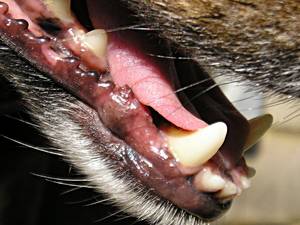Gingivitis in Dogs and Cats

Dental disease is extremely common in our canine and feline companions. It is estimated that over 80% of pets over the age of three have gum disease. Dogs tend to be affected earlier in life than cats.
Have you noticed a bit of an odor coming from your pet's mouth? Bad breath is one of the common signs of dental disease, along with your pet going off its food or having difficulty eating, being very sensitive around the mouth, drooling or losing weight.
Dental disease happens when bacteria build up on the teeth. Those nice pearly whites become caked in tartar or plaque, giving them a yellowish hue. As the bacteria proliferate under the tartar, they eat away into the gum and the tooth. The gums become red and inflamed, causing gingivitis.
Gingivitis can eventually destroy tooth roots or cause mouth abscesses if left untreated, often necessitating tooth removal. In the worst cases, some animals have suffered broken jaws as a result of dental disease. Antibiotics are generally required to help treat the infection in the mouth.
|
Chewy treats
|
| Pet Shed's most popular products to help your dog or cat clean their teeth: |
However mouth disease is only the tip of the iceberg. Bacteria from the teeth can seed off and make their way into the bloodstream. From there, they are carried to organs in the body which receive a high bloodflow. Liver disease, heart valve disease and kidney disease have all been linked to dental disease. These can make an animal very sick indeed, and can be potentially fatal.
However, there are ways to slow the build-up of tartar on the teeth, with most being simple things which can be done at home. When the disease becomes severe, a visit to the vet is in order, as animals usually require a general anesthetic to have the teeth cleaned and the tartar removed from them, or in some cases, teeth taken out.
�
�
�
�
|
References
|
| 1. Tilley L.P., Smith, F.W.K. The Five Minute Veterinary Consult Canine and
Feline. Second Edition. Lippincott Williams & Wilkins, Baltimore, 2000. 2. Hills Pet Nutrition. Canine t/d. www.hillspet.com 3. Greenies information. www.greenies.com.au |